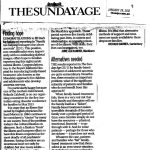Maudsley in the media
Maudsley in the media

Finding hope - responsible media can help bring hope to sufferers of eating disorders. - The Sunday Age, Melbourne, January 29, 2012
A small ripple in the mainstream media pond. Looking forward to the day we make a big splash, make waves, inspire and speed change in treatment and care for people of all ages who suffer eating disorders.
Melbourne, (January 29th, 2012) The Sunday Age runs my letter:
Finding hope
CONGRATULATIONS to Jill Stark for balanced reporting in ”Family ties helping teenagers rise above anorexia” (22/1). This positive, non-sensationalist story, importantly with no misleading skeletal images, offers hope to families experiencing this nightmarish mental illness. Congratulations, too, to the Royal Children’s Hospital for introducing family-based treatment (also known as the Maudsley approach) for children and adolescents who develop anorexia nervosa.
I’m particularly happy because one of the mothers interviewed, Belinda Caldwell, is on our organising committee for the first Australian eating disorder conference for families in May 2013.
It is crazy that an illness first noted by English physician Richard Morton in 1694 continues to be considered a ”choice” by many in our society. Part of the problem today is the cultural fixation on slimness. Such a fixation ”feeds” the illness and hampers efforts to have this illness respected as the most deadly of all psychiatric illnesses. Eating disorders are an enormous issue not only for children but also many adults – often high achievers – who missed out on that vital early intervention treatment offered in the Maudsley approach. These partial survivors live lonely, debilitating part-lives, in careers and relationships, as ongoing prisoners of the illness. With skills, their lives can be regained, too.
JUNE ALEXANDER, Blackburn
The Sunday Age also runs this letter:
Alternatives needed
THE results reported in The Sunday Age (22/1) for family-based treatment of adolescent anorexia are quite extraordinary. Nonetheless, there remains an important problem: what of the significant minority of patients and families who do not benefit from this approach?
When family-based treatment fails, there is a very real risk that both family and therapists will see the family itself as a ”failure”. Family-based treatment makes incredible demands of the entire family over a prolonged period of time; some families simply do not have the resources – physical, emotional, financial – to go through with it. And for some patients – perhaps for those who are sickest – it just does not work.
Whatever the case, patients and families who ”fail” family-based treatment now find themselves in an even worse situation, their ”failure” compounding the turmoil already created by this most enigmatic and destructive illness. It is vital that alternative methods of support and treatment are made available to these desperate families.
RICHARD BARNES, Canterbury
LET’S BUILD ON THE EVIDENCE-BASED RESEARCH
I invite your discussion. I believe we have come a long way but there is a long, long way to go in achieving proper service delivery of treatment and support for people of all ages suffering the illness of eating disorders:
* One issue is training. Regarding family-based treatment (Maudsley), we need more training of therapists with correct accreditation. If a therapist advertises that they ‘do’ Maudsley, without proper training, they can ‘do’ more harm than good.
* The Maudsley or family-based treatment method (FBT) has the runs on the board in evidence-based research as the most successful treatment for early intervention of Anorexia in children and adolescents. Let’s embrace and build on this. No one treatment fits all sufferers and all families. We are individuals. But Maudsley fits most. Let’s accept this. Research is being carried out to refine this model, to meet the needs of more families.
* Families need to have opportunity for immediate access to care when they feel concerned their child is developing an eating disorder. They need to be able to see a therapist trained in eating disorder diagnosis. Early intervention is best at all times.
* For the many people who have missed out on early intervention, we need more care all around. Daily I receive letters from adults aged 20 and more, who are feeling desperate for understanding, support and treatment.
I am dedicated to raising awareness of the need for better care. A small letter in The Age today has made my day. Together we are creating waves of change.





